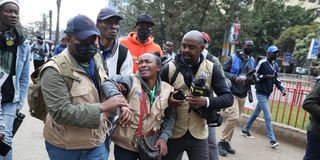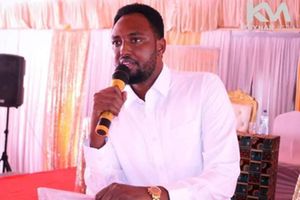Maandamano: Raila, UN body condemn police excesses, attack on journalists

Cecilia Ngunjiri, a journalist who was attacked by police.
Orange Democratic Movement leader Raila Odinga and the United Nations have condemned police excesses in dealing with demonstrators as well as attacks on journalists covering the protests, which they have warned threatens democracy and the exercise of the freedom of expression and of the media in the country.
In a statement, Mr Odinga said the police excesses, especially during the Nane Nane (August 8) protests were of deep concern especially “arbitrary arrests, detentions, and excessive use of force by the police, which led to the harassment of peaceful protesters and journalists, including a member of the international press, Larry Madowo of CNN.”
“These actions are not only unacceptable but also a direct violation of the rights enshrined in our Constitution. The right to peaceful assembly, the freedom of expression, and the protection of journalists are fundamental pillars of our democracy, pillars that we have fought long and hard to establish and must continue to protect,” Mr Odinga said in a statement.
“I want to make it clear that I stand with the people in their quest for justice, freedom, and the full realisation of their rights. I strongly condemn the actions taken by the police and call upon the relevant authorities to respect the constitutional rights of all Kenyans. I also urge the immediate release of those who were unjustly detained and a thorough investigation into the misconduct of the officers involved,” he added.
On its part, the United Nations Educational, Scientific and Cultural Organization (Unesco) said journalists are usually the crucial lifelines to verified information for citizens.
The journalists, UNESCO said, facilitate public debate and dialogue, which are pathways to democratic solutions.
"Authorities must guarantee the safety of journalists covering protests, in line with international freedom of expression standards," UNESCO said in a statement, adding it continues to monitor attacks and threats against journalists that "undermine their legitimate role of informing populations with accurate and verified information."
Cecilia Ngunjiri, a journalist with Real Stories Media, was covering the police and the protesters in action at the precincts of the National Archive when the police turned on her and her colleagues.
The police first warned that they did not want to see anybody then lobbed the teargas at the battery of journalists, she narrated. In the choking fumes of the teargas, as the colleagues dispersed, she was overwhelmed and the police descended on her with clubs.
In the brief seconds of the ordeal, she was left bruised and had to seek medical attention before being discharged.
"I did not provoke the police in any way," Ms Ngunjiri told Nation.
The police brutality on journalists was sporadic, as witnessed by several Nation Media Group journalists covering the protests.
"They just lobbed teargas at us. The contingent of police around the Dedan Kimathi monument was notorious," a colleague said of his experience with police on that very day.
Read: Media owners condemn targeting of journalists during anti-government protests
Several other journalists sustained injuries of varying magnitudes.
Lucky Oluoch, a journalist with the Mediamax Network, lamented that the police had just lobbed a teargas canister at his feet.
Both local and international media were targeted by the police, with CNN Journalist Larry Madowo also experiencing the brutality.
"These guys (the police) kept deliberately throwing stun grenades to explode at us and other journalists who were behind them in Nairobi," Mr Madowo posted on social media. "They didn't want to be followed.”
Citizen TV's Stephen Letoo, having experienced his share of the ordeal, decried: “How Police today have turned to harm journalists at the CBD is totally unacceptable…several scribes injured."
“Police fire live ammunition at protesters, journalists during the ‘Nane Nane March’ protests” Citizen Tv posted on X at 5,33pm, accompanied by a video showing the brutal action of the police on the press.
Following the spate of attacks on journalists, the Media Council of Kenya CEO David Omwoyo urged the state and the press to find a “common ground” while UNESCO called on all authorities concerned to "ensure the safety of journalists covering protests around the world, in accordance with international norms and human rights obligations."
Read: Nation journalists covering Nandi gold mine tragedy threatened by OCPD
“The government and the media are under no obligation to like each other. They must agree to exist and identify common principles and values on which to engage, including duty to the nation,” Mr Omwoyo said. “It is time the government and editors found a common ground and prioritised the unity of the country by way of creating a framework of communicating critical national issues while respecting each other’s independence and duty.”
In the wake of anti-government protests, journalists have been particularly targeted by the police. Thursday evening, the Acting Inspector General (IG) of Police Gilbert Masengeli was at pains to satisfactorily explain the distasteful conduct of his junior officers during the Nane Nane protest. Instead, he only emphasized the importance of cooperation between journalists and police.
“It is because of you that we have known some other bad guys [who have infiltrated the peaceful demos],” he said. “And in this regard, I just urge the fourth estate so that we unite and work together as a team as we continue making sure we save our country for a better Kenya.”
The police abducted Nation Media Group's Macharia Gaitho before being released. Nakuru-based journalist Catherine Wanjeri was shot by police when covering the Generation Z protests.
The media fraternity took to the streets to protest the brutality. But weeks later, the trend has continued, in a very alarming phenomenon.





